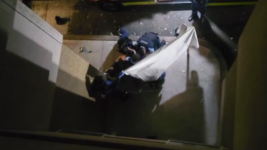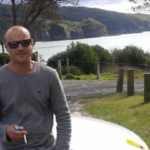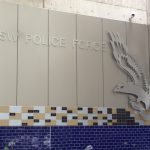NSW Police Officers Cause Death of Yet Another Mentally Ill Person

New South Wales police officers restrained 45-year-old gay man Colin Burling to death on Gadigal land in the inner-city suburb of Waterloo sometime after 2.40 am on Tuesday 15 July 2025. State law enforcement had been called out to provide a welfare check on him, which has again led to a fatality in NSW. This time the incident involved officers piling on top of him to restrain him, until he could not breathe.
Emergency services had been called out as Burling was having a mental health episode. The man cooperatively got into an ambulance, but his subsequent behaviour then led four police officers to require him to exit the vehicle, so they could wrestle him to the ground, restrain him by applying pressure and then sedate him, and whether any sedation was forthcoming has not been revealed.
Burling’s partner, Taite Collins, captured the incident on his camera, as his partner called out, “I’ve done nothing wrong. I can’t breathe. I am dying. Help.” Two other officers held up a white sheet to shield the view of their colleagues wrestling the civilian on the ground until he stopped breathing. This was apparently so onlookers could not witness the scene. However, Collins filmed from above.
NSW assistant police commissioner Peter McKenna said the man had resisted ambulance staff, so police then handcuffed and restrained him, prior to his evidently suffering a cardiac arrest. The senior officer added that the ambulance had called the police for urgent assistance, and detectives are now investigating the incident with the Law Enforcement Conduct Commission oversighting it.
But this fatality comes on the back of a spate of other deaths resulting from police responding to welfare checks or mental health episodes over recent years, and an inquiry found that police as first responders is problematic, while a campaign has been launched calling for alternative first responders. And this incident too highlights police use of a restraint position that can prove lethal.
Sending out the wrong people
“The video footage of this horrifying and tragic incident demonstrates the continued failure of this state to provide the right care, right person to the vulnerable people of NSW in their moment of need,” said NSW Greens MLC Sue Higginson, whose been leading parliamentary calls for police reform, in relation to excessive use of force and sending them in as first responders to crises.
“Watching a man die in the arms of police as he screams for help is incredibly distressing,” the Greens justice spokesperson made certain. “This must be the turning point for premier Chris Minns and police minister Yasmin Catley to do something.”
NSW police officers being first responders to mental health crises is a decadeslong issue. But it came to a head in May 2023, when a NSW police officer fatally tasered a 95-year-old woman suffering dementia in a nursing home, as she was holding a steak knife and attempting to flee the room with the aid of her walking frame.
The death of Clare Nowland occurred just months after Minns took office and led Higginson to call for an inquiry into policing, including the use of force. These calls have been repeatedly dismissed, and by January 2024, four more people had been killed by police during crises. Although the adequacy of police as first responders was addressed by a broader inquiry into mental health access.
The inquiry recommended that NSW police and NSW Health develop a response to welfare checks that doesn’t rely on brute force. In her comments, Higginson referenced the Right Care, Right Person model launched by London police in 2023, which involves an alternative Triple 1 emergency number that allows the public to call for responders for mental health crises and avoid police involvement.
“It keeps happening, police keep killing and harming vulnerable people, and it’s got to stop,” Higginson added on Tuesday. “It doesn’t have to be this way. Labor must implement the recommendations from the Greens-led mental health inquiry. The cost of continued inaction from the Minns Labor government is human lives – vulnerable human lives.”
Killing in the name of
The scene captured by Collins as a number of NSW police officers killed his partner Burling, appears exactly as such incidents always appear: a group of blue uniformed officers swarming on top of a person held face down on their stomach, or held in the prone position, and officers continue to apply further force because the person is resisting, but of course, they’re resisting, as they’re being killed.
Restraining a person in the prone position using pressure from their own bodies is a technique that’s liberally applied by law enforcement officers around the continent, sometimes with the inclusion of a knee in the back of the neck, despite it being well known that the application of this hold can prove fatal.
Most recently, Northern Territory police officers allegedly wrestled with Warlpiri man Kumanjayi White in a supermarket in Mparntwe-Alice Springs until he stopped breathing and died. White was a man who suffered disabilities. He was in a dispute with shop security over allegedly attempting to steal food, when two plainclothes police officers took over with fatal results.
Dunghutti man David Dungay Junior was held in the prone position with five men on top of him in Long Bay Gaol in December 2015, until he died. He, like Burling, called out that he couldn’t breathe. Dungay called this out a dozen times, and at one point a specialist prison guard restraining him told the dying man that if he was talking, he could breathe. This turned out not to be true.
South Australian police officers recently restrained 42-year-old Indian man Gaurav Kundi, after they’d tackled him to the ground out the front of his house, as his partner called out that he’d done nothing wrong. The police then wrestled with him whilst he was in the prone position, until he became unresponsive and later died in hospital.
So, all this begs the questions why, when police keep killing people when restraining them in the prone position, the practice continues, and further, why does NSW Labor refuse to consider alternatives to police as first responders to mental health crises, when about half a dozen people have died as a result of having police attend to their episodes, during their current term in office.







